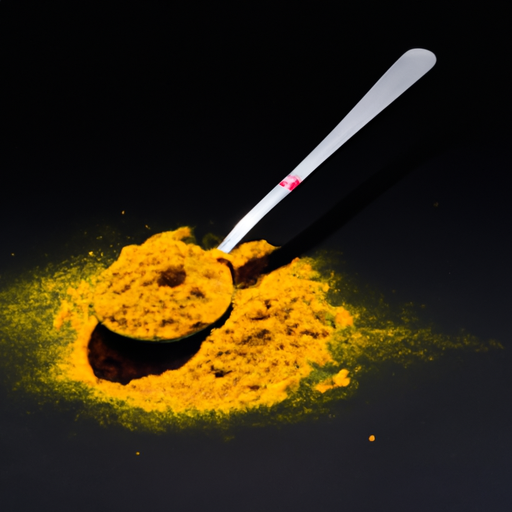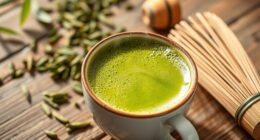Did you know that chronic inflammation has been linked to a range of health issues, including heart disease, diabetes, and even certain cancers? It’s a startling statistic that highlights the importance of finding natural ways to reduce inflammation in our bodies.
One such remedy that has gained attention in recent years is turmeric tea. With its vibrant yellow color and distinct earthy flavor, turmeric has been used for centuries in traditional medicine for its anti-inflammatory properties. But what is it about turmeric that makes it so effective? The answer lies in its active compound called curcumin. Research has shown that curcumin has powerful anti-inflammatory effects, targeting multiple pathways in the body to reduce inflammation.
In this article, we will explore the science behind turmeric’s anti-inflammatory properties, the benefits of drinking turmeric tea for inflammatory conditions, and how to incorporate it into your daily routine.
So, grab a cup of turmeric tea and let’s dive in!
Key Takeaways
- Turmeric tea has natural anti-inflammatory properties due to the presence of curcumin.
- Drinking turmeric tea reduces markers of inflammation, such as C-reactive protein.
- Turmeric tea modulates the immune response and prevents chronic inflammation.
- Turmeric tea alleviates arthritis pain and stiffness, improving mobility and quality of life for arthritis sufferers.
The Science Behind Turmeric’s Anti-Inflammatory Properties
Get ready to dive into the fascinating world of turmeric’s anti-inflammatory powers and uncover the science behind its golden healing properties.
Turmeric tea has long been hailed for its numerous health benefits, particularly its anti-inflammatory effects. Research has shown that turmeric tea can help reduce inflammation in the body, which is the root cause of many chronic diseases.
Studies have found that curcumin, the active compound in turmeric, plays a crucial role in its anti-inflammatory properties. Curcumin inhibits the activity of certain enzymes and proteins that promote inflammation in the body. It also has antioxidant properties, which help combat oxidative stress and reduce inflammation.
One study published in the Journal of Medicinal Food found that consuming turmeric tea significantly reduced markers of inflammation in the body. Participants who drank turmeric tea experienced a decrease in levels of C-reactive protein, a marker of inflammation in the body. Another study published in the journal Phytotherapy Research found that curcumin in turmeric tea can inhibit the production of inflammatory molecules in the body.
Turmeric tea has been shown to have powerful anti-inflammatory effects, thanks to its active compound, curcumin. Incorporating turmeric tea into your daily routine may help reduce inflammation and improve overall health.
Now, let’s explore more about curcumin: the active compound in turmeric.
Curcumin: The Active Compound in Turmeric
Curcumin, the powerhouse compound found in turmeric, packs a punch when it comes to combating inflammation, making it a superhero in the fight against pain and swelling. Here are three reasons why curcumin in turmeric is so effective in reducing inflammation:
-
Powerful antioxidant: Curcumin is known for its potent antioxidant properties. It helps neutralize harmful free radicals in the body, which can cause inflammation and damage to cells. By scavenging these free radicals, curcumin helps reduce inflammation and promote overall health.
-
Modulates immune response: Curcumin has been found to modulate the immune response in the body. It inhibits the production of inflammatory molecules, such as cytokines and enzymes, that play a role in the inflammatory process. This modulation helps control inflammation and prevents it from becoming chronic.
-
Targets multiple pathways: Curcumin targets multiple pathways involved in the inflammatory process. It inhibits the activity of various enzymes and proteins that promote inflammation, including cyclooxygenase-2 (COX-2) and nuclear factor-kappa B (NF-κB). By targeting these pathways, curcumin helps reduce inflammation at its source.
Curcumin’s impressive anti-inflammatory properties make it a popular ingredient in turmeric supplements and turmeric recipes. Now, let’s delve into how turmeric reduces inflammation in the body without causing any side effects.
How Turmeric Reduces Inflammation in the Body
Discover the fascinating way that this golden spice works its magic, soothing your body from within and banishing those pesky aches and pains. Turmeric, with its active compound curcumin, has been found to have anti-inflammatory properties that can help alleviate conditions such as arthritis and promote gut health.
Studies have shown that curcumin, found in turmeric, has the ability to inhibit certain molecules in the body that trigger inflammation. It works by blocking the activation of inflammatory pathways, reducing the production of inflammatory cytokines and enzymes. This is beneficial for those suffering from arthritis, as it can help reduce joint pain and stiffness.
Furthermore, turmeric has been shown to support gut health. It has been found to have anti-inflammatory effects on the gut lining, helping to reduce inflammation and improve digestion. This can be particularly beneficial for individuals with conditions such as irritable bowel syndrome (IBS) or inflammatory bowel disease (IBD).
By incorporating turmeric into your diet, such as through drinking turmeric tea, you can harness its anti-inflammatory properties and potentially experience relief from inflammatory conditions. The benefits of drinking turmeric tea for inflammatory conditions extend beyond just reducing inflammation, as we will explore in the next section.
Benefits of Drinking Turmeric Tea for Inflammatory Conditions
You can reap the benefits of drinking turmeric tea by reducing the inflammation in your body, potentially improving your overall health and well-being. Research has shown that incorporating turmeric into your diet can lead to a significant reduction in inflammatory markers, indicating its potential to effectively combat inflammation-related conditions.
Turmeric tea has been found to provide relief from arthritis pain. Curcumin, the active compound in turmeric, has been shown to have anti-inflammatory effects and can help alleviate symptoms of arthritis such as joint pain and swelling. By regularly drinking turmeric tea, you may experience a reduction in arthritis-related inflammation, allowing for improved mobility and a better quality of life.
In addition to arthritis pain relief, turmeric tea can also promote gut health. Studies have shown that curcumin can help reduce gut inflammation and improve digestive function. By incorporating turmeric tea into your daily routine, you may experience a reduction in digestive issues such as bloating, gas, and stomach discomfort.
By incorporating turmeric tea into your daily routine, you can potentially reduce inflammation, alleviate arthritis pain, and improve gut health. This natural remedy holds promise for those seeking a holistic approach to managing inflammatory conditions.
Incorporating Turmeric Tea into Your Daily Routine
Start your day off right by adding a warm and comforting cup of golden elixir to your morning routine. Turmeric tea is not only delicious, but it also offers numerous health benefits, particularly for reducing inflammation. Here are four ways to incorporate turmeric tea into your daily routine:
-
Turmeric Tea Recipes for Beginners: If you’re new to turmeric tea, start with a simple recipe. Boil one cup of water, add half a teaspoon of turmeric powder, a pinch of black pepper (to enhance turmeric’s absorption), and a squeeze of lemon or honey for added flavor. Stir well and enjoy!
-
Turmeric Tea for Post-Workout Recovery: After a strenuous workout, turmeric tea can help reduce inflammation and aid in muscle recovery. Add a teaspoon of turmeric powder, a tablespoon of grated ginger, and a dash of cinnamon to hot water. Let it steep for a few minutes, strain, and drink up!
-
Turmeric Tea Latte: For a creamy and indulgent treat, try a turmeric tea latte. Heat one cup of milk (dairy or plant-based) with one teaspoon of turmeric powder, a pinch of cinnamon, and a sweetener of your choice. Froth the mixture and enjoy a cozy, inflammation-fighting latte.
-
Iced Turmeric Tea: On hot summer days, cool down with a refreshing glass of iced turmeric tea. Brew a cup of turmeric tea using any recipe mentioned above, let it cool, and pour it over ice. Add a slice of lemon or a sprig of mint for extra flavor.
Incorporating turmeric tea into your daily routine is a simple and enjoyable way to reap its anti-inflammatory benefits. Transitioning into the next section, turmeric also offers a range of other health benefits worth exploring.
Other Health Benefits of Turmeric
Incorporating turmeric tea into your daily routine is an excellent way to reap its numerous health benefits. Apart from its anti-inflammatory properties, turmeric has been found to offer other advantages as well. For instance, it can be beneficial for your skin. Turmeric contains compounds that’ve been shown to help improve skin conditions such as acne, psoriasis, and eczema. Its anti-inflammatory and antioxidant properties may help reduce redness, inflammation, and the appearance of scars.
Additionally, turmeric can also aid in digestion. It’s traditionally used to treat digestive issues like indigestion, bloating, and gas. The active compound in turmeric, called curcumin, has been found to stimulate the production of bile, which’s essential for the digestion and absorption of fats. It may also help reduce symptoms of inflammatory bowel disease, such as Crohn’s disease and ulcerative colitis.
By incorporating turmeric tea into your daily routine, you can not only enjoy its anti-inflammatory benefits but also promote healthier skin and improved digestion. However, it’s important to note that turmeric may interact with certain medications and can cause allergic reactions in some individuals. Therefore, precautions and considerations should be taken when using turmeric as an anti-inflammatory.
Precautions and Considerations When Using Turmeric as an Anti-Inflammatory
Before diving into the potential benefits of turmeric as an anti-inflammatory, it’s crucial to tread carefully and be aware of the possible precautions and considerations that come along with its usage. While turmeric has shown promising results in reducing inflammation, it’s important to understand the appropriate dosage and potential side effects.
Here are four key factors to keep in mind when using turmeric as an anti-inflammatory:
-
Turmeric Dosage: It’s essential to follow the recommended dosage guidelines when consuming turmeric. Generally, a daily dosage of 500-2000 mg of turmeric extract is considered safe and effective for reducing inflammation. However, it’s always advisable to consult with a healthcare professional to determine the appropriate dosage for your specific condition.
-
Potential Side Effects: While turmeric is generally well-tolerated, some individuals may experience side effects such as digestive issues, nausea, or allergic reactions. It’s important to monitor your body’s response and discontinue use if any adverse reactions occur.
-
Interactions with Medications: Turmeric may interact with certain medications, including blood thinners and diabetes medications. If you’re taking any prescribed medications, it’s essential to consult with your healthcare provider before incorporating turmeric into your routine to avoid any potential interactions.
-
Individual Sensitivities: Each person’s body may respond differently to turmeric. It’s essential to be aware of any personal sensitivities or allergies to turmeric or its active compound, curcumin, and adjust the dosage accordingly.
By considering these precautions and consulting with a healthcare professional, you can safely incorporate turmeric as an anti-inflammatory agent into your wellness routine.
Frequently Asked Questions
Can turmeric tea be used as a substitute for medication in treating inflammatory conditions?
Turmeric tea can be an effective alternative to medication for treating inflammatory conditions. Studies suggest that its active compound, curcumin, has anti-inflammatory properties. However, it’s important to consult with a healthcare professional before making any changes to your treatment plan.
Are there any potential side effects of consuming turmeric tea for inflammation?
There are a few potential side effects of consuming turmeric tea for inflammation, such as digestive issues, allergic reactions, and blood thinning. It’s important to consult with a healthcare professional before incorporating it into your routine.
What is the recommended dosage of turmeric tea for reducing inflammation?
What are the dosage guidelines for turmeric tea to reduce inflammation? The recommended dosage is 1-2 teaspoons of turmeric powder per day, which has been shown to provide significant health benefits for inflammation.
Can turmeric tea help with chronic inflammatory conditions such as arthritis?
Yes, turmeric tea can help with chronic inflammatory conditions like arthritis. Studies show that its active compound, curcumin, has anti-inflammatory effects. Comparatively, turmeric tea has been found to be as effective as other natural remedies for reducing inflammation.
Are there any specific conditions or medications that may interact negatively with turmeric tea for inflammation?
Potential drug interactions, precautions, and contraindications should be considered before using turmeric tea for inflammation. It is important to consult with a healthcare professional to ensure its safe use with specific conditions or medications.
Conclusion
In conclusion, incorporating turmeric tea into your daily routine can be a beneficial way to reduce inflammation in the body. The active compound in turmeric, curcumin, has been scientifically proven to possess anti-inflammatory properties.
One interesting statistic to note is that a study published in the Journal of Alternative and Complementary Medicine found that curcumin was more effective than a placebo in reducing symptoms of inflammation in patients with rheumatoid arthritis.
With its numerous health benefits and minimal side effects, turmeric tea is a natural and effective option for managing inflammatory conditions.










